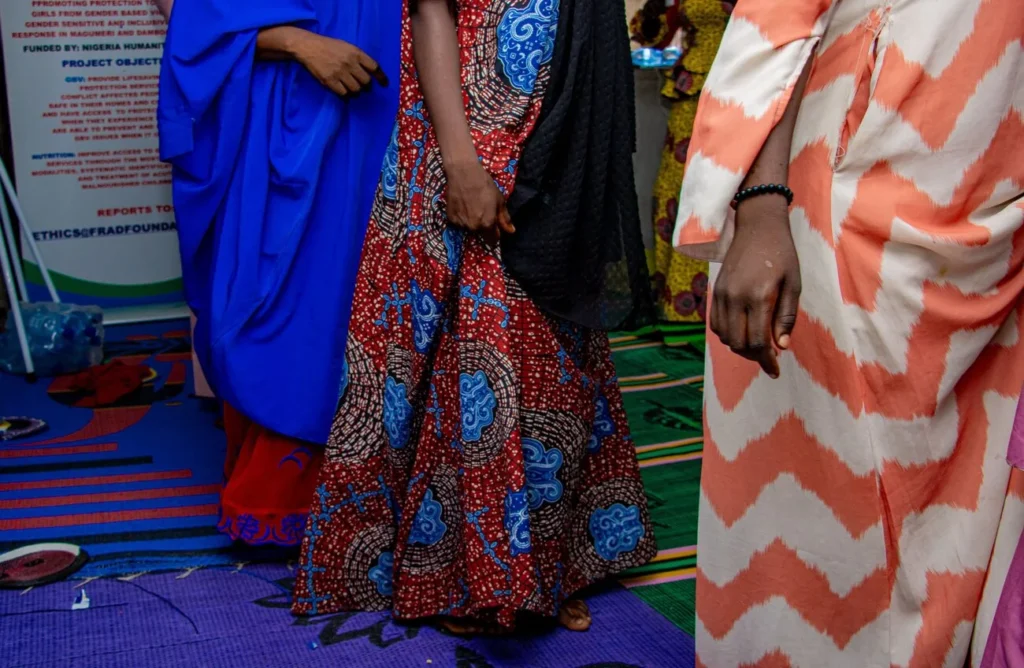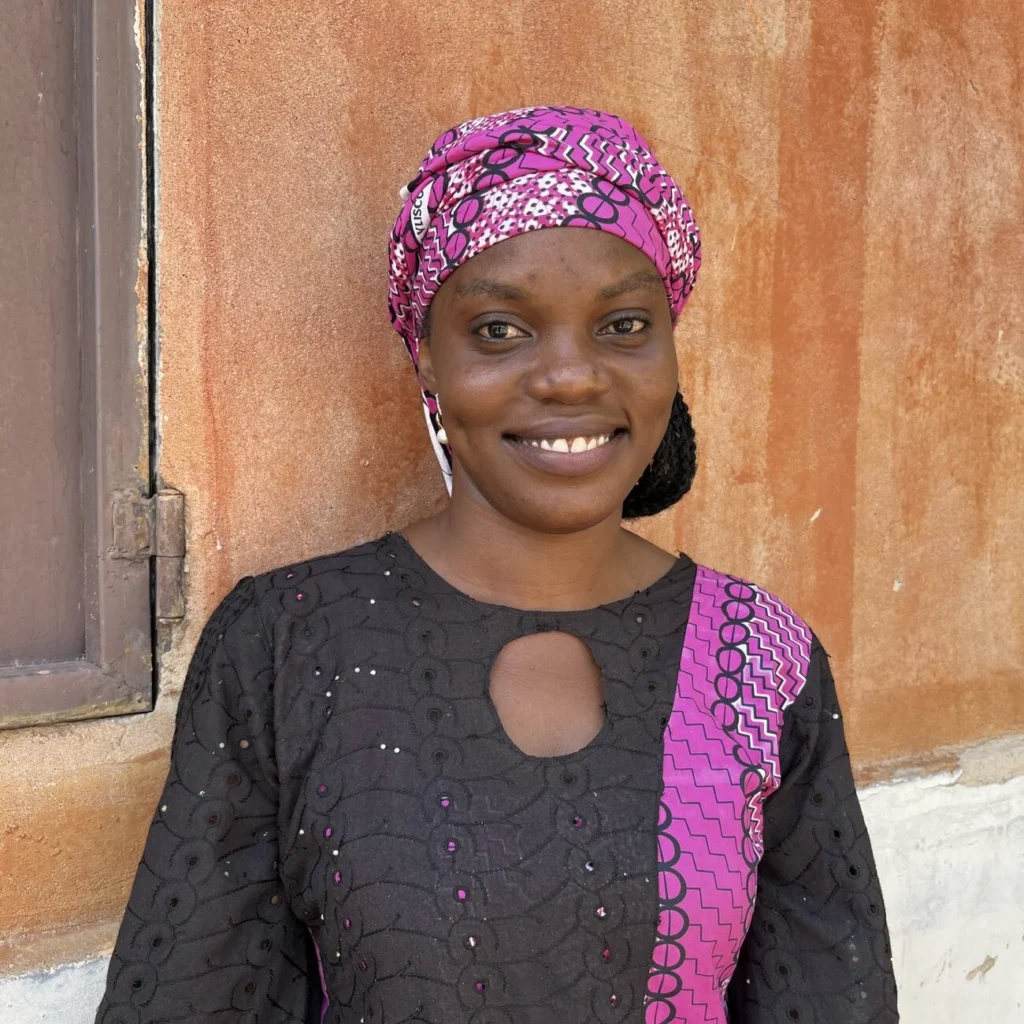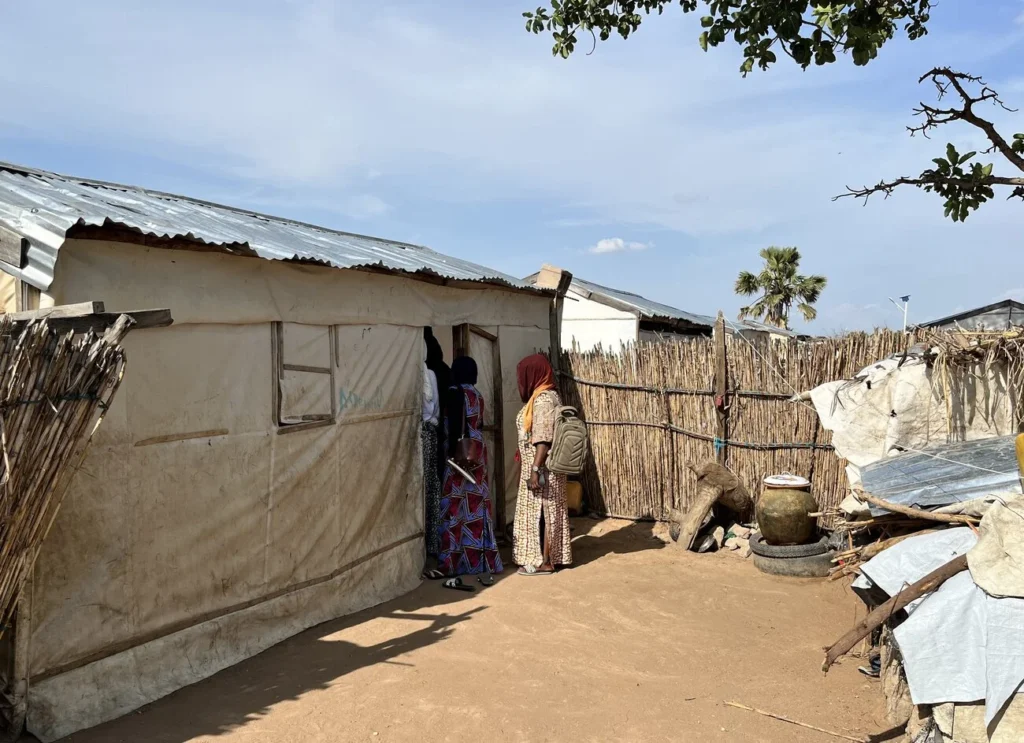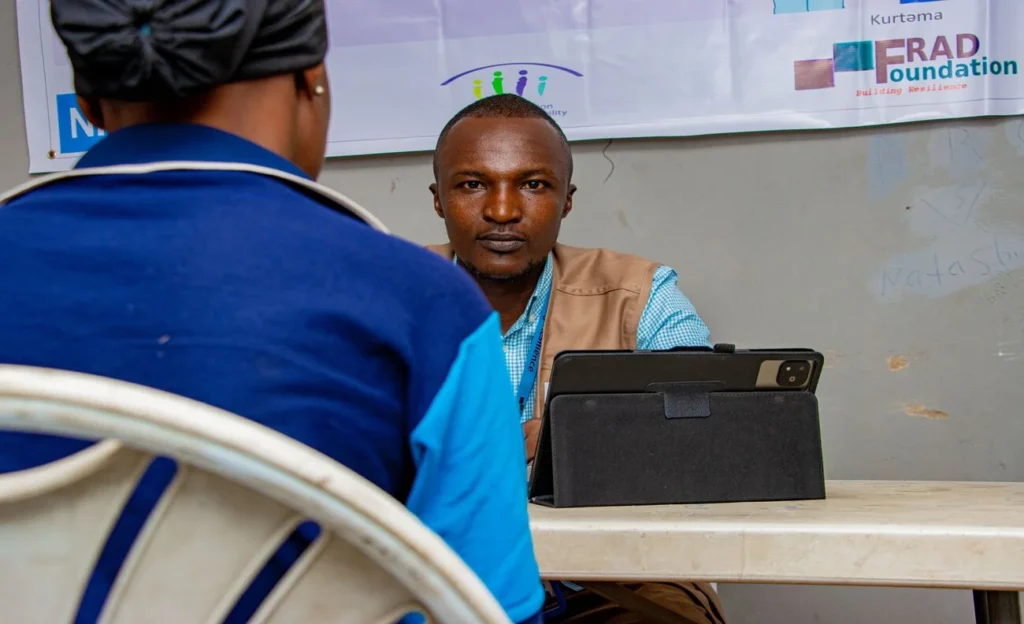We meet in the New Jerusalem internally displaced persons (IDP) camp in Maiduguri. Around us, temporary shelters made of flimsy wood structures and tarpaulins have become permanent homes for those who fled the attacks and kidnappings of Boko Haram.
Women have gathered in the camp’s safe space, like they do every week, to attend a group therapy session. Their shared suffering connects them to each other, but I won’t ask details.
They start with a song and a dance. Laughter, games, babies running around. The room is filled with the bright colours of their skirts and dresses.
At the centre of attention is their community mobiliser, T*, a fellow survivor of Boko Haram captivity.
Her work begins before the project even starts: meeting with locals and community leaders, explaining the project’s aims and that those who were subjected to sexual violence are not to blame for what they suffered. T runs group support activities with survivors and accompanies project caseworkers on their weekly home visits. She will remain by their side for the duration of the project.


Close up. New Jerusalem safe space,
Maiduguri. Nigeria, June 2025. FRAD

In the middle of the room, she rallies 30 women to stand up, dance, sing, move. She is sweating in the 40-degree heat of northeast Nigeria, but carries on singing: “I bought a farm, it’s a mango farm, there are many trees, come pluck them with me, sweet mangoes, mangoes.”
They move, and they laugh. The dance goes on for several minutes.
“Do you like coming here?” I ask.
Faces light up and women nod enthusiastically.
“I enjoy it because I forget anything I think about and helps me recover from trauma and it keeps me engaged,” shares one participant. “Before, when I went to sleep, I used to think about the violence I saw, but now when I go to bed I think about the sessions.”
‘Seeing you is healing me too…’
The development and full delivery of a GSF project with partners takes on average between 18 to 24 months. The mobilisers are there throughout, and their deep involvement in the project is striking.
Alongside them are caseworkers, who are assigned a group of survivors for the duration of the project. In Borno and Adamawa states, I see first-hand how their work and care for survivors really is the foundation of the project, helping them on their journey to mental, physical, economic, and social recovery.
“We are not coming out to ‘work’ but to watch the lives of people transform”, says caseworker Joy Jitau James.
They come and tell us about their problems, they count on us. They learn, but we do too. I learn about their resilience. They do not let their story put them down, and they move forward with their lives.
— Joy Jitau James, Caseworker

The first phase of a project, dedicated to identifying survivors, must be done with care and caution. It is here that the mobilisers and case workers – whether survivors themselves, or members of the community – make a crucial difference. Without them, nothing can move forward
T takes a break from the session and shares a bit more: “I feel good in this job and working with the survivors – when they tell their stories – I see that it heals me from the wounds I have in my heart. It has a great impact on me.”
At a safe space in Yola, Adamawa, caseworker Blessing addresses survivors at another meeting. She becomes emotional as she reflects on how the women have grown over the course of the project, and says meeting the survivors has changed her life.
“Your life has changed. It’s not your fault what happened. Look at you today, you can do this for yourself and for your children,” she says. “I am very happy and I am proud.”
Watching over each other
The close relationships mobilisers, caseworkers and counsellors develop with survivors comes at a price. Every staff member has been trained on vicarious trauma and benefits from regular counselling sessions. During the identification process, Blessing says they were moved as a result of the stories they heard. Others had difficulties sleeping. Now, they say, they are stronger.
Godiya, a caseworker in Maiduguri, explains it like this: “If you are not strong enough you end up crying with them – you need to comfort them and make them believe in the fact that they can recover from what they lost. I used to have these stories in my head – and now I speak to others about this…otherwise I risk breaking down and not doing my job.”


Outside the house and grain shop of a project participant. Nigeria, June 2025. Sarah-Eve Hammond/GSF

Opening up
In ten days, we met hundreds of women who had survived the horrors of Boko Haram, but no men. Grace Peter, the coordinator for our partner FRAD in Borno, explains that it is harder for men to realise that they are survivors of conflict-related sexual violence. Here, community awareness sessions are even more important in showing men that they too can be victims.
“The caseworkers explain that anyone can be a survivor,” he says of the meetings. “That’s the way we get to them. It’s hard for them to start opening up.”
In Adamawa, three men are part of the project while in Borno, 15 have come forward.
“It’s different with them, says Abraham, a case worker in Borno. “We conduct separate sessions from the women group for cultural and religious reasons.”


Abraham Akpa is a caseworker for FRAD. New Jerusalem safe place, Maiduguri. Nigeria, June 2025. FRAD

Colleagues from FRAD explain that a higher number of men have come forward in Borno, known as the “epicentre” of sexual violence cases, because there “the ceiling of trauma has been broken.” Many men have come forward, and even those who are not survivors want to share their stories.
Stigma persists however – as female survivors struggle to understand and accept their male counterparts. Many don’t understand that being forced to rape a woman makes a man a victim himself. “They are forced to do so”, explains FRAD Director Ibrahim Balami, “If you don’t, you can be sure they will kill you.”
Back in the safe space in Borno, T reflects on how her work has changed her own life. In committing herself to the women in this room, her fellow survivors have given her purpose again.
“Waking up, I used to think that my life will never be good. Now I wake up and I think about new ideas to share with the women, new activities. I want to change their lives.”
*names have been changed or omitted for confidentiality.
The author extends her thanks to the colleagues from partner organisations FRAD Foundation and YIAT for their insight and contributions to this article.